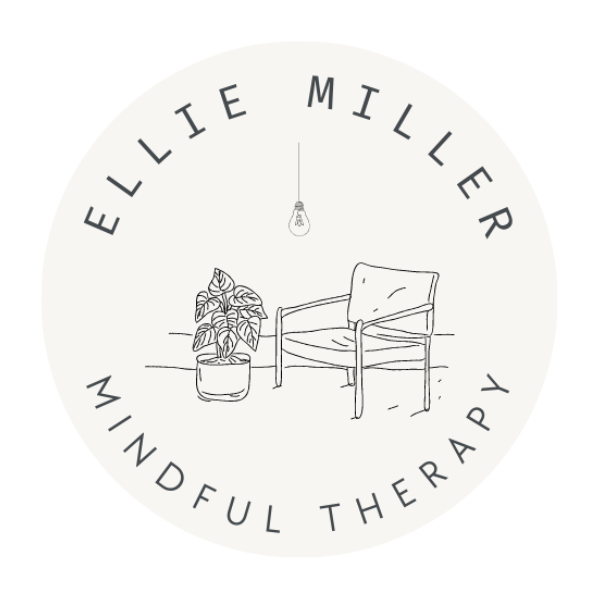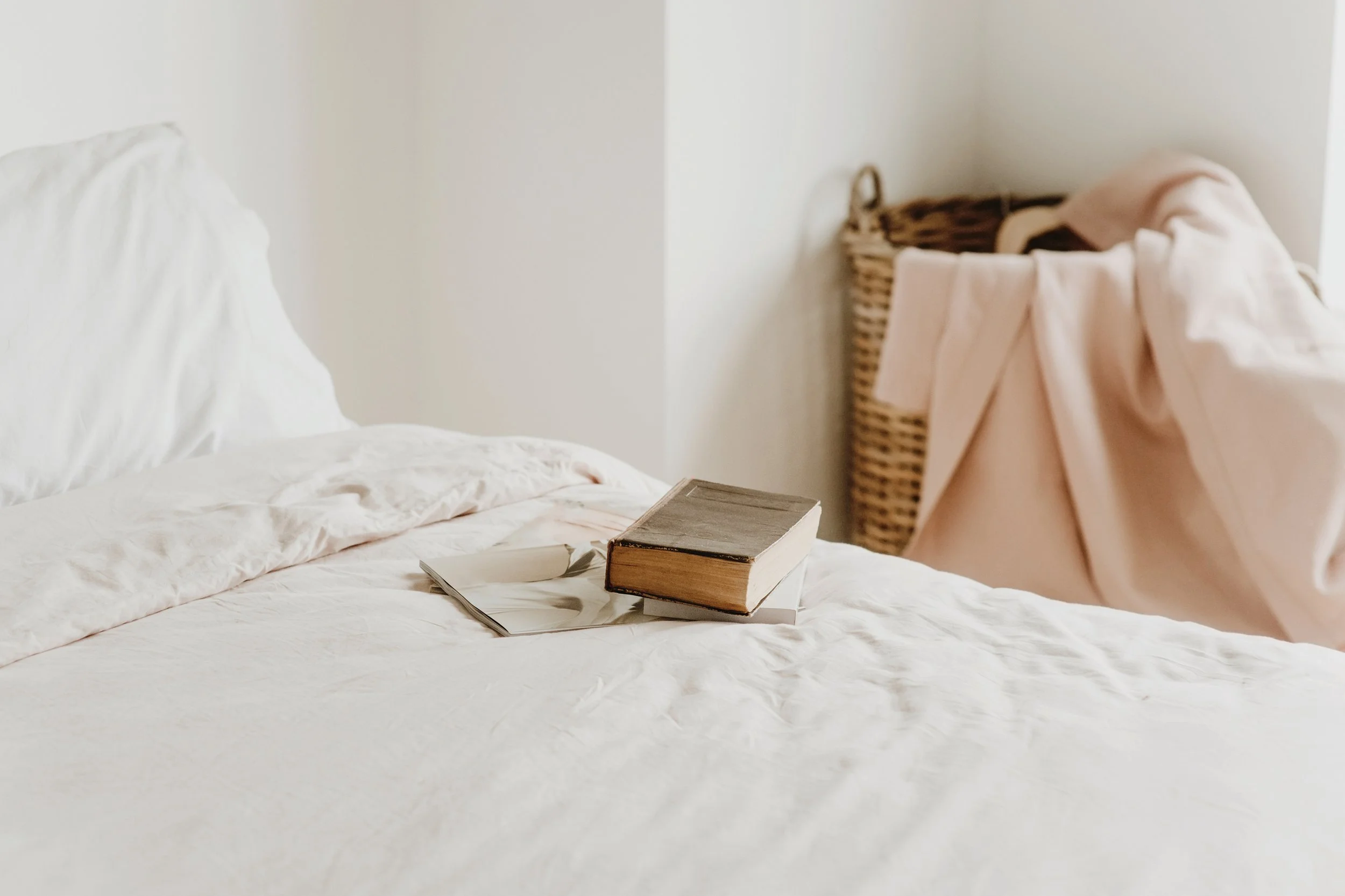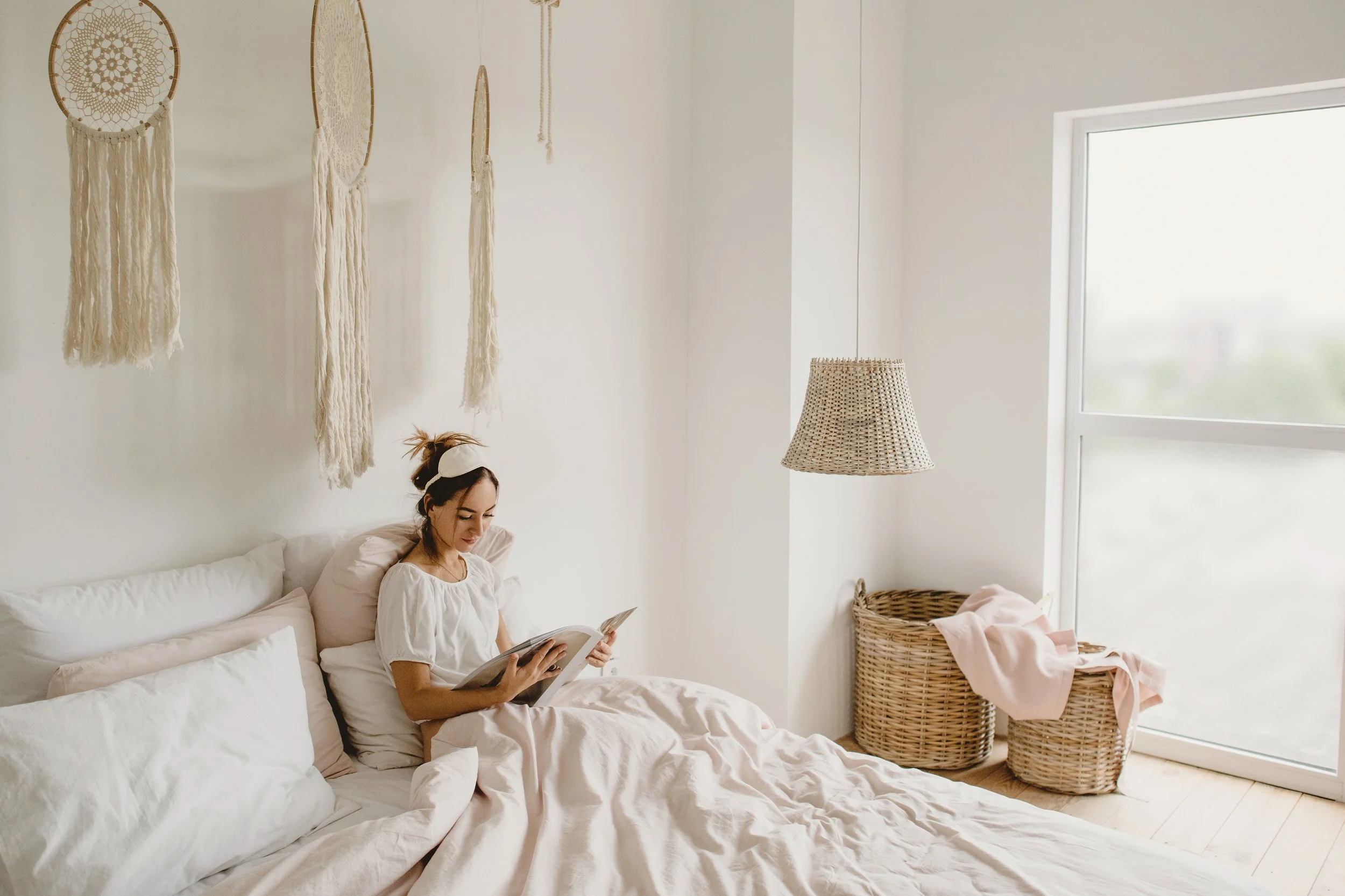Rest Assured: How to Ease Nighttime Anxiety
If you struggle with stress and anxiety like most folks, it’s safe to say that you’ve had your fair share of restless nights tossing and turning or struggling to even fall asleep. Maybe your mind keeps churning with something you wish you hadn’t said, something you’re worried might go wrong, or it’s going into hyper planning mode.
The Sleep Struggle→
Anxiety Loop.
Does this cycle sound familiar to ya?
1.) Feel pressure to get good sleep
2.) Have some trouble falling asleep
3.) Worry about not getting enough sleep
4.) Gets even harder to fall asleep, cuz now you’re worried about not sleeping.
Rinse and repeat.
Anxiety and sleep problems often have a "chicken and the egg" relationship, where one issue can trigger or exacerbate the other. For example, anxiety can lead to sleep problems, and sleep problems can worsen anxiety symptoms (American Academy of Sleep Medicine, 2014).
When we are anxious, our bodies and minds are in a state of heightened arousal, making it difficult to relax and fall asleep. Lack of sleep can then increase anxiety symptoms, such as irritability, difficulty concentrating, and racing thoughts. Over time, this can create a vicious cycle where anxiety and sleep problems feed into each other.
Breaking this cycle requires a nuanced approach that addresses both anxiety and sleep issues. By using relaxation techniques, cognitive strategies, and creating a healthy sleep environment, we can improve both the quantity and quality of our sleep, and reduce anxiety symptoms in the process.
Please-Take Some Pressure off Yourself!
Shift the focus from falling asleep to getting good rest.
Research shows that:
Putting too much pressure on ourselves to sleep can lead to more sleep anxiety and insomnia.
Instead of focusing solely on the amount of time we spend sleeping, it's important to shift our mindset to prioritize rest. This can be achieved through mindfulness and relaxation techniques, which promote a sense of calm and restfulness even if sleep doesn't come right away. These concepts are also discussed in the book The Sleep Solution, by W. Chris Winter, which I highly recommend!
If you take away one thing from this post it’s this: Try shifting your mindset from the goal of how fast you can fall asleep and how much you sleep, to a focus on getting rest.
Instead of focusing solely on the amount of time we spend sleeping, it's important to shift our mindset to prioritize rest.
Resting Easier: A Threefold Approach
Whatever your mind’s flavor of keeping you up is, I have some tips that could be a game changer for ya.
I’ve categorized these tips into three buckets:
1.) Pre-bedtime tips
2.) How to relax body tension
3.) How to quiet your mind
Everything included in steps 2 and 3 can be used whether you’re struggling to fall asleep, or you’re having a hard time falling back to sleep in the wee hours of the night.
Shall we dive in?
Part 1: Getting Ready for Bed
Let’s set you up for success! Ok, ok, I’m SURE you’ve heard about good sleep hygiene at this point, but I can’t help myself. I’m including it here, just in case a refresher could help.
If you haven’t tried these basics, sounds like you have a good place to start on moving towards better sleep!
Basic Sleep Hygiene
Stick to a regular sleep schedule, even on weekends.
Create a comfortable sleep environment by keeping your bedroom dark, cool, and quiet.
Use your bed only for sleep and sex.
Limit exposure to electronic devices before bedtime.
Avoid caffeine, nicotine, and alcohol before bedtime.
Exercise regularly, but avoid intense workouts close to bedtime.
Avoid large meals before bedtime.
Develop a relaxing bedtime routine, such as taking a warm bath or practicing relaxation techniques like deep breathing or meditation.
Manage stress through healthy coping mechanisms like exercise, mindfulness, or talking with a trusted friend or therapist.
Aaactually, It's Not Just About Blue Light.
Research suggests it could actually be the content on your screen that's keeping you up at night.
((Ahmadi, 2020)
Ever find yourself mindlessly scrolling through your phone right before bed, even though you know it's not the best for your sleep? You might think the blue light is the main culprit, but research suggests it could actually be the content on your screen that's keeping you up at night.
The constant stimulation from notifications and the feeling of needing to check our phones can be addictive and make it harder to wind down before bed (Ahmadi, 2020).
The constant reward-click cycle of social media apps and the intense, violent content of TV shows and movies can ramp up our minds and make it harder to relax and fall asleep.
So next time you're tempted to binge-watch a true crime documentary or scroll through your Instagram feed, consider switching to a more calming activity like reading or even just watching a show that’s less stressful. Your mind (and your sleep) will thank you!
The constant stimulation from our phones can be addictive and make it harder to wind down before bed.
Part 2: Relaxing Your Body
Relaxing your body is a key component of getting a good night's sleep. When our muscles are tense and our bodies are wound up, it can be hard to drift off into deep, restful sleep. But with a little bit of intention, it's possible to release that tension and sink into a state of total relaxation. Here are some tips to help you do just that:
-
Close your eyes and mentally scan your body from head to toe, focusing on each body part and consciously relaxing any tension you find. This can help you release physical stress and bring awareness to your body.
Here’s a quick guided version.
-
Visualize a warm, comforting light surrounding your body, penetrating your muscles and relaxing them one by one. This technique can help you feel cozy and secure, preparing you for a restful sleep.
-
Tense and release each muscle group in your body, starting with your toes and moving upward. This technique can help you release physical tension and calm your nervous system.
-
Lie down and listen to a guided meditation that leads you through a deep state of relaxation. This technique can help you release mental and physical stress and drift into a peaceful sleep.
Check out my favorite guided yoga nidra here
-
Take slow, deep breaths, inhaling for a count of 4, holding for a count of 7, and exhaling for a count of 8. This technique can help you calm your mind and body and prepare for sleep.
Check out this post for more breathing exercises.
Part 3: Relaxing Your Mind
Sometimes, it's not our bodies that keep us up at night, but our minds. Racing thoughts, worries, and anxieties can make it nearly impossible to fall asleep. Here are some tips that can help you let go of those nagging thoughts and drift off into peaceful slumber😴
-
Unhooking from thoughts means learning to observe your thoughts without getting entangled in them, or pulled around by them.
There’s SO many ways to practice unhooking from thoughts, but here are a few of my fave methods that you can experiment with:
-Mentally note, “just a thought” and come back to your breath
-Label/categorize the thought (planning, worrying, criticizing, etc) and come back to the present
-Mentally sing the thought as lyrics to the tune of your favorite song.
-
Instead of putting pressure on yourself to fall asleep, try focusing on resting your body and mind.
Practice relaxation techniques like deep breathing, visualization, or progressive muscle relaxation.
Remember, even if you're not sleeping, your body is still getting some benefits from rest
-
Picture yourself sitting beside a gently flowing stream. As thoughts come up, imagine them as leaves floating on the water.
Watch them as they float away and disappear from view. This can be a powerful visualization technique for letting go of racing thoughts.
-
Lay in your bed and focus on your breath. When your mind wanders (which it will), gently bring it back to your breath.
You can also try counting each inhale and exhale, or repeating a calming mantra.
-
Starting at 10, count down with each exhale. When you get to 1, start back up. Repeat as needed.
Sweet Dreams
Getting a good night's rest (see what I did there? REST, not sleep 😉) is crucial for our physical and mental well-being. While it may seem like an elusive goal at times, there are many simple and effective strategies that we can incorporate into our bedtime routine to promote relaxation and restfulness.
By making small changes to our environment, mindset, and habits, we can set ourselves up for success when it comes to getting the sleep we need. Whether it's trying a new relaxation technique, being more intentional about screen time before bed, or practicing mindfulness, there is no one-size-fits-all solution when it comes to sleep.
It's important to find what works best for us as individuals and prioritize making sleep a priority in our daily lives. So tonight, let's all take a deep breath, relax our bodies and minds, and drift off into a peaceful slumber.
Baltimore Therapy for Couples & Women with Anxiety
Hi! I’m Ellie, a Baltimore based private practice therapist offering online therapy to empathetic women & couples in Maryland.
I help women manage anxiety & stress and couples strengthen their relationships.
If you want more anxiety tools and tips from my private practice, straight to your inbox, I’d love to have you join The Detangler, my weekly lighthearted newsletter.
I
f you live in Maryland or Virginia, reach out to see if we’re a good fit for therapy!
Sources
American Academy of Sleep Medicine. (2014). Insomnia. Retrieved from https://aasm.org/resources/factsheets/insomnia.pdf.
Nabi, R. L., Prestin, A., & So, J. (2018). When do we stop thinking about them? Cognitive persistence in entertainment media use. Journal of Broadcasting & Electronic Media, 62(4), 619-636. doi: 10.1080/08838151.2018.1517642
Winter, W. C. (2017). The Sleep Solution: Why Your Sleep is Broken and How to Fix It. Berkley.











